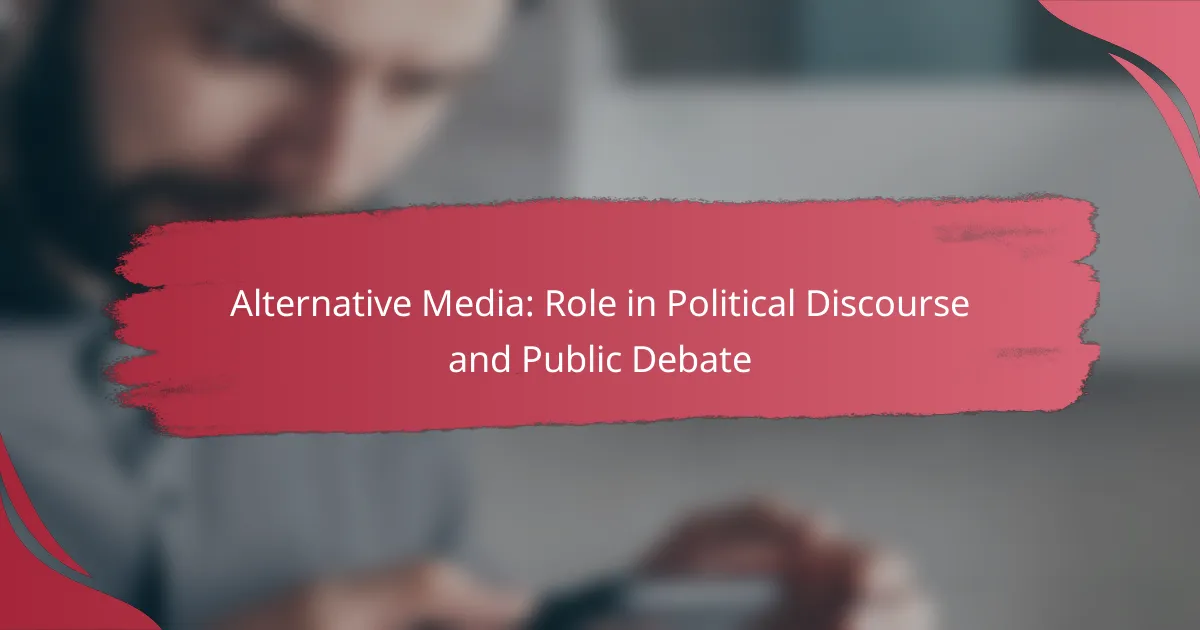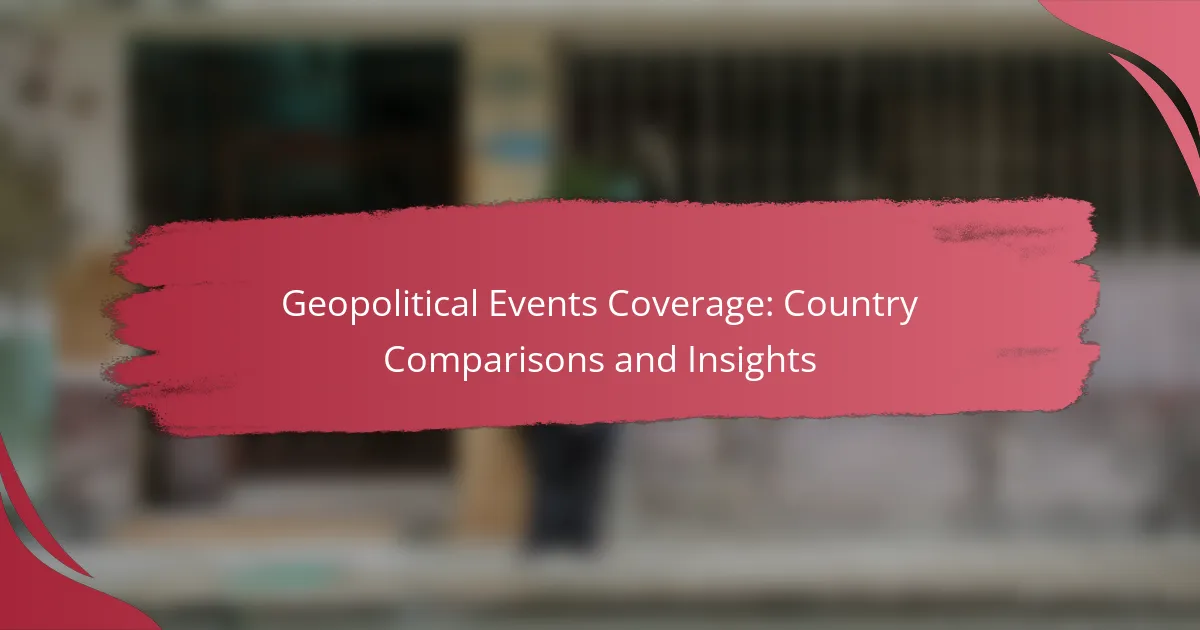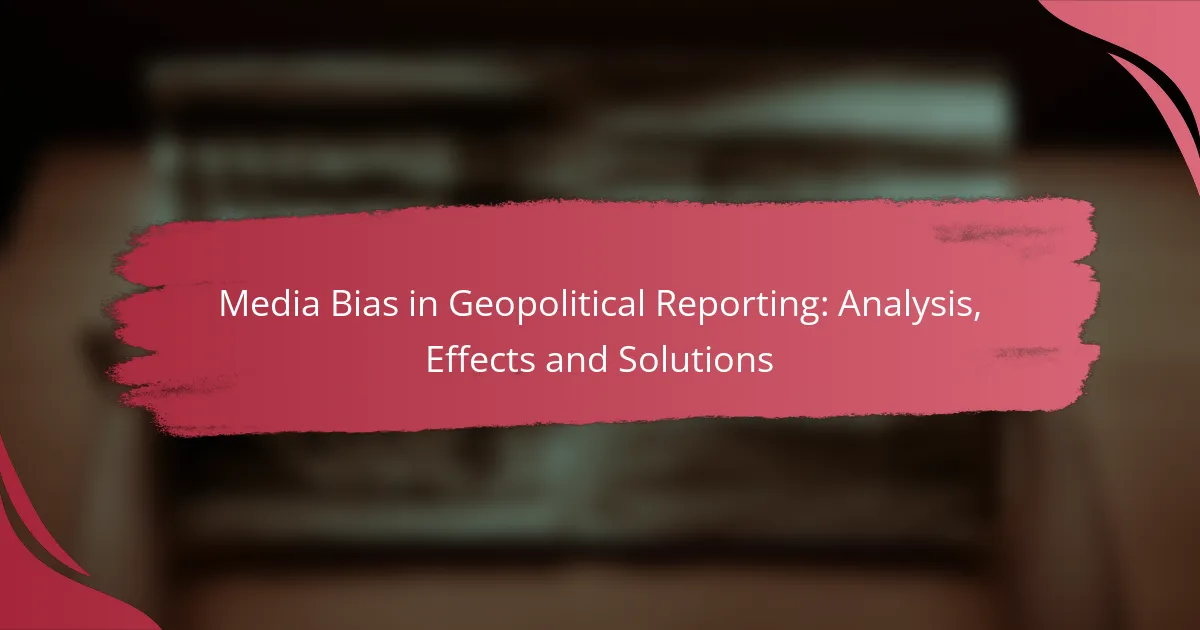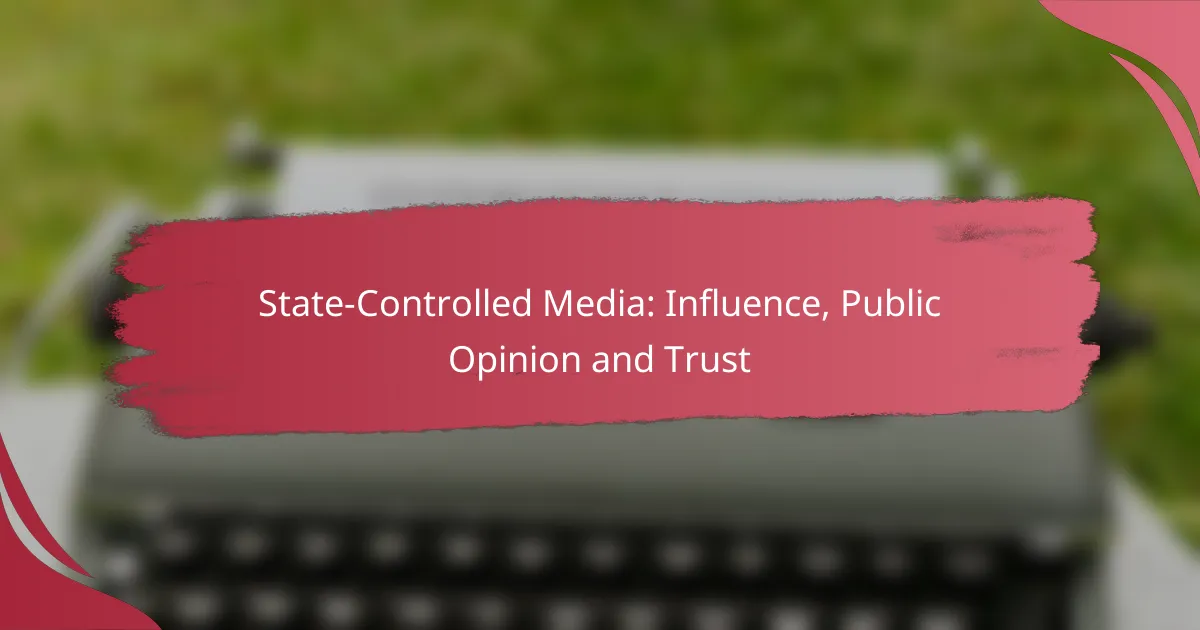Alternative media plays a crucial role in shaping political discourse by amplifying voices that are often overlooked by mainstream outlets. By offering diverse narratives and fostering public engagement, these platforms challenge dominant ideologies and encourage a more inclusive debate on pressing issues.
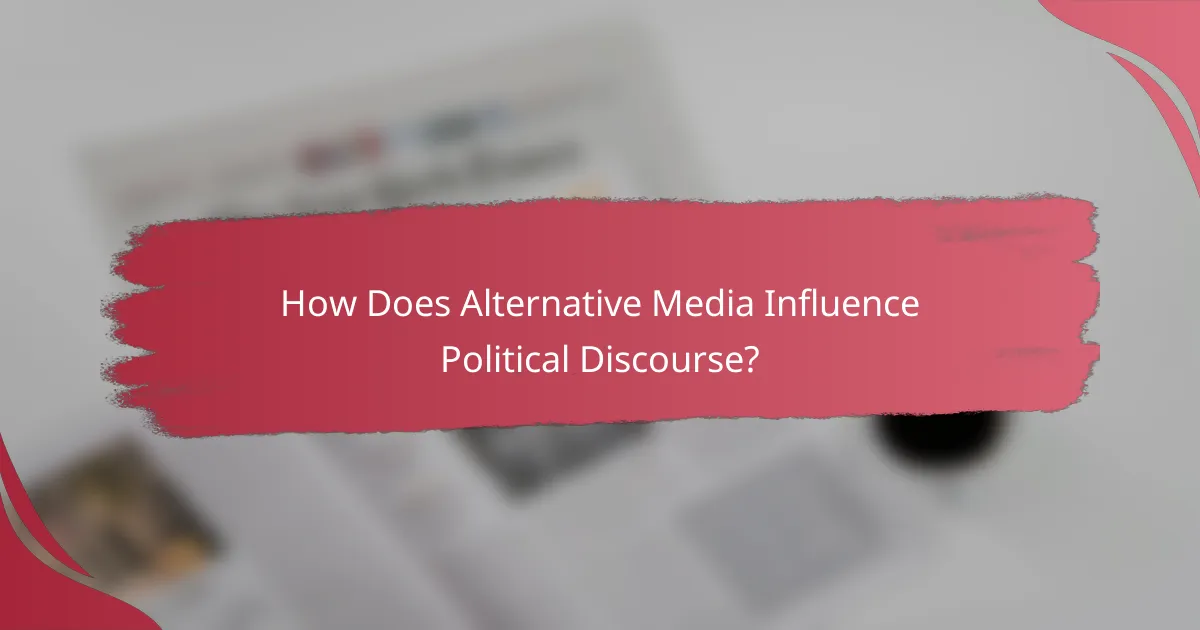
How Does Alternative Media Influence Political Discourse?
Alternative media significantly shapes political discourse by providing platforms for voices often marginalized in mainstream outlets. This influence manifests through the dissemination of diverse narratives, challenging dominant ideologies and fostering public engagement.
Shifts public opinion
Alternative media can effectively shift public opinion by presenting information that contrasts with mainstream narratives. By highlighting underreported issues or perspectives, these platforms can sway the beliefs and attitudes of their audiences, especially during pivotal events like elections or social movements.
For instance, during significant political events, alternative media outlets often cover grassroots campaigns or local issues that mainstream media may overlook. This coverage can lead to increased awareness and support for causes that resonate with specific communities.
Encourages diverse viewpoints
Alternative media plays a crucial role in encouraging diverse viewpoints by offering a space for voices that might otherwise be silenced. This inclusivity allows for a broader range of opinions, fostering a more comprehensive understanding of complex political issues.
Platforms such as blogs, podcasts, and independent news sites often feature interviews and discussions that include minority perspectives. This approach not only enriches public debate but also empowers individuals to engage in political discourse actively.
Facilitates grassroots movements
Alternative media is instrumental in facilitating grassroots movements by providing the necessary tools for organization and mobilization. These platforms enable activists to share information quickly, coordinate events, and rally support for their causes.
Social media, in particular, has transformed how grassroots movements operate, allowing for rapid dissemination of information and real-time updates. Campaigns like #MeToo and Black Lives Matter have utilized alternative media to amplify their messages and connect with a global audience, demonstrating the power of these platforms in driving social change.
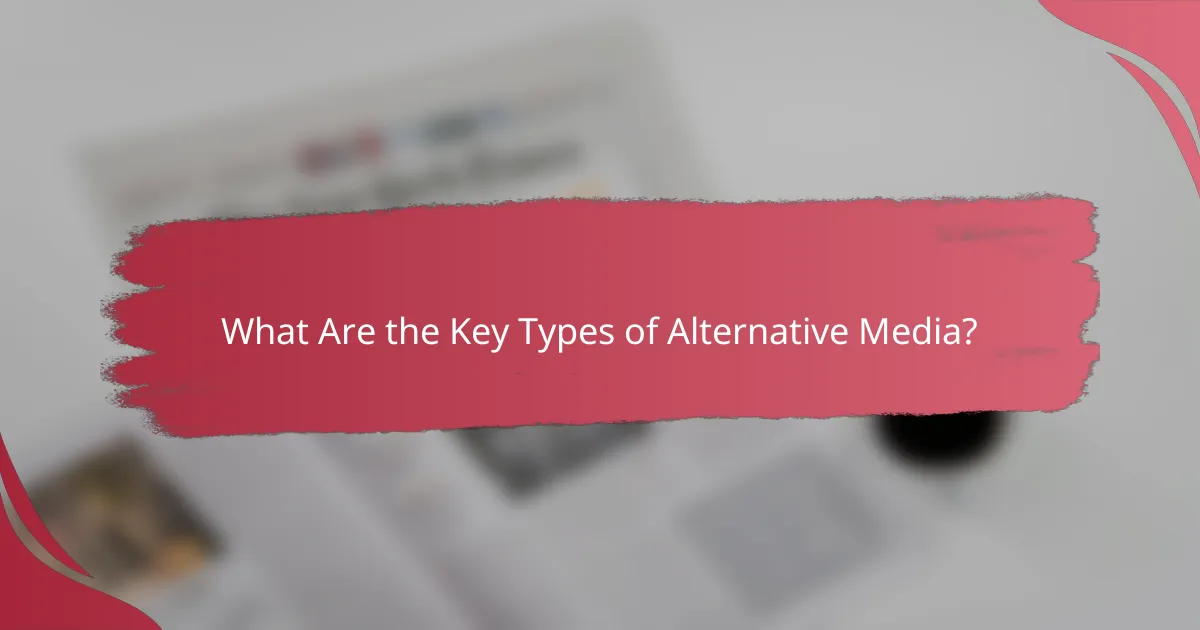
What Are the Key Types of Alternative Media?
Alternative media encompasses various platforms that provide news and information outside mainstream channels. These types include independent news websites, podcasts, online radio, and social media platforms, each playing a unique role in shaping political discourse and public debate.
Independent news websites
Independent news websites serve as crucial sources of information that often challenge mainstream narratives. They typically focus on underreported issues, providing in-depth analysis and diverse perspectives that may not be available in traditional media.
Examples include sites like Democracy Now! and Al Jazeera, which offer news coverage from unique angles. When evaluating these sites, consider their funding sources and editorial independence to gauge reliability.
Podcasts and online radio
Podcasts and online radio have surged in popularity, offering a platform for discussions on political issues in a more accessible format. They allow for deep dives into topics, often featuring expert interviews and listener engagement.
Popular examples include NPR podcasts and independent shows like The Daily. When choosing podcasts, look for those that provide balanced viewpoints and fact-check their claims to ensure quality content.
Social media platforms
Social media platforms have transformed how information is shared and consumed, enabling rapid dissemination of news and opinions. They facilitate direct interaction between users and public figures, often amplifying grassroots movements and alternative viewpoints.
Platforms like Twitter, Facebook, and Instagram can serve as both news sources and discussion forums. However, users should be cautious of misinformation and verify sources before sharing content. Engaging critically with posts and following reputable accounts can enhance the quality of information consumed.

How Do Alternative Media Platforms Compare to Traditional Media?
Alternative media platforms often provide a different approach to news and information compared to traditional media, focusing on niche audiences and diverse perspectives. They typically emphasize user engagement and rapid content sharing, which can lead to a more dynamic public discourse.
Greater audience engagement
Alternative media platforms foster greater audience engagement by allowing users to interact directly with content through comments, shares, and likes. This interactivity encourages discussions and debates, creating a sense of community among users who share similar interests or viewpoints.
For example, social media channels and blogs often feature polls or open forums where audiences can express their opinions, which traditional media may not accommodate as effectively. This participatory approach can lead to a more invested audience, enhancing the overall impact of the content.
Less editorial control
Alternative media typically operates with less editorial oversight than traditional outlets, which can result in a wider range of viewpoints but also raises concerns about accuracy and reliability. Content creators on these platforms often prioritize personal expression over journalistic standards, leading to potential misinformation.
This lack of editorial control means that consumers must critically evaluate the sources and claims presented in alternative media. Users should be cautious and cross-check information against reputable sources to avoid falling for misleading narratives.
Faster dissemination of information
Alternative media platforms excel in the rapid dissemination of information, often breaking news stories much quicker than traditional media. The use of social media and instant publishing tools allows for real-time updates, which can be crucial during breaking news events.
For instance, a significant event may be reported on Twitter within minutes, while traditional news outlets might take hours to provide a comprehensive report. However, the speed of information sharing can sometimes compromise thorough fact-checking, so users should remain vigilant about the credibility of the information they consume.
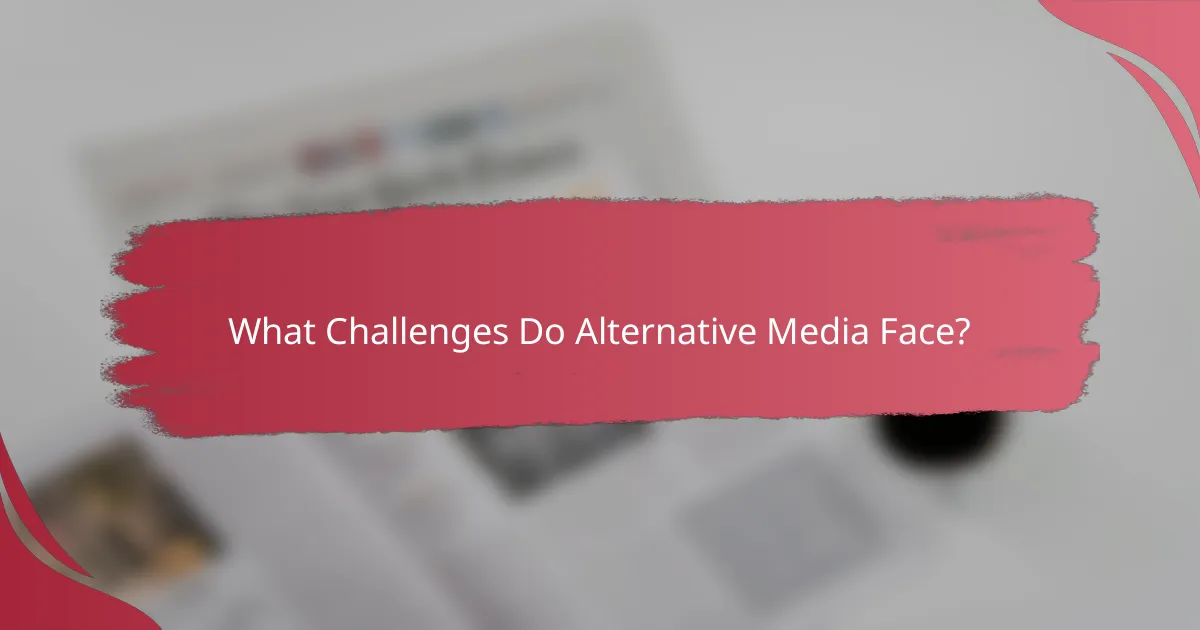
What Challenges Do Alternative Media Face?
Alternative media encounters several significant challenges that impact its effectiveness in political discourse and public debate. These challenges primarily revolve around funding, sustainability, credibility, and the prevalence of misinformation.
Funding and sustainability issues
Funding is a critical challenge for alternative media outlets, which often rely on donations, crowdfunding, or grants rather than traditional advertising revenue. This dependence can lead to financial instability, making it difficult for these organizations to maintain consistent operations.
Many alternative media sources struggle to secure long-term funding, which can limit their ability to invest in quality journalism and expand their reach. Establishing a diverse funding model that includes memberships or partnerships can help mitigate these sustainability issues.
Credibility and misinformation concerns
Credibility is a major concern for alternative media, as these outlets often face skepticism from mainstream audiences. The lack of established reputation can lead to challenges in gaining trust, especially when competing against well-known media organizations.
Misinformation is another significant issue, as alternative media can inadvertently spread false information, especially when relying on unverified sources. To combat this, alternative media outlets should prioritize fact-checking and transparency in their reporting processes to enhance their credibility.
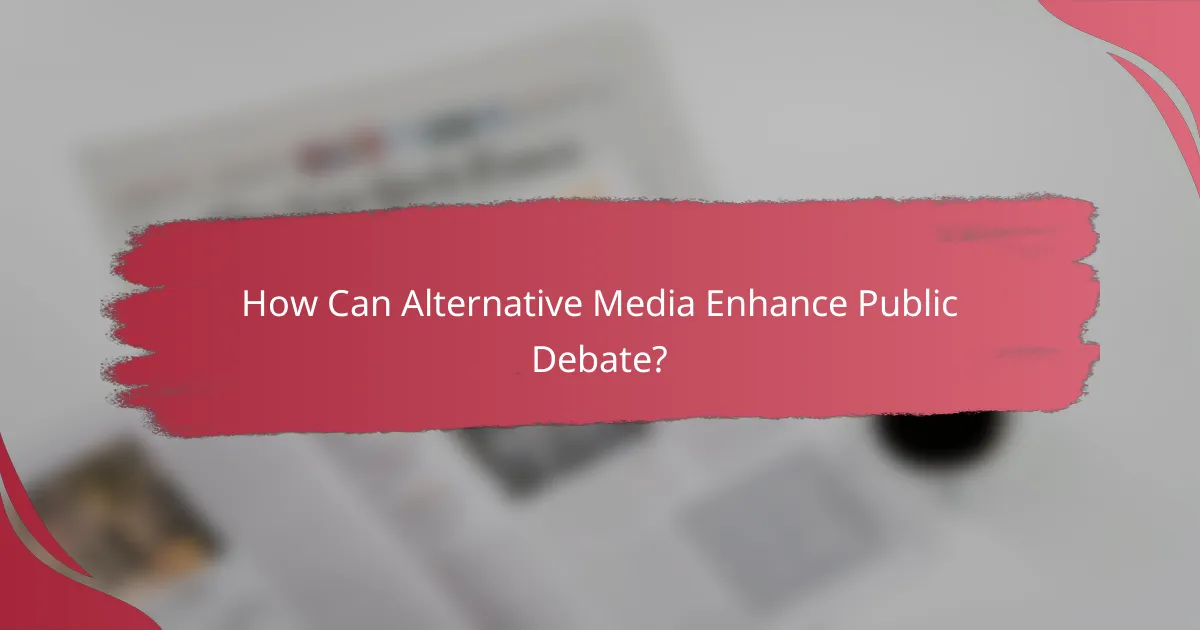
How Can Alternative Media Enhance Public Debate?
Alternative media can significantly enhance public debate by providing diverse perspectives and facilitating discussions that mainstream outlets may overlook. By amplifying marginalized voices and encouraging participation, these platforms foster a more inclusive political discourse.
Providing underrepresented voices
Alternative media serves as a crucial platform for voices that are often ignored or misrepresented in mainstream media. This includes minority communities, grassroots organizations, and independent thinkers who can share their experiences and viewpoints. For example, local podcasts or community blogs can highlight issues pertinent to specific demographics, enriching the overall dialogue.
By showcasing these underrepresented perspectives, alternative media not only diversifies the conversation but also challenges dominant narratives. This can lead to a more nuanced understanding of social and political issues, encouraging audiences to consider viewpoints they might not encounter elsewhere.
Encouraging civic participation
Alternative media plays a vital role in motivating civic engagement among citizens. By providing information on local events, grassroots movements, and political initiatives, these platforms can inspire individuals to take action in their communities. For instance, social media campaigns can mobilize support for local causes or encourage attendance at town hall meetings.
Moreover, alternative media often emphasizes the importance of civic responsibility, urging citizens to participate in elections and community discussions. This can be particularly effective in areas where traditional media may not adequately cover local politics, ensuring that residents are informed and empowered to make their voices heard.

What Role Do Social Media Algorithms Play?
Social media algorithms significantly influence political discourse and public debate by determining what content users see. These algorithms prioritize engagement, often amplifying sensational or polarizing content, which can shape public opinion and discourse dynamics.
How Algorithms Determine Content Visibility
Algorithms assess user behavior, such as likes, shares, and comments, to curate a personalized feed. This means that users are more likely to see content that aligns with their interests and beliefs, which can create echo chambers. For example, if a user frequently engages with political posts, the algorithm will prioritize similar content, potentially limiting exposure to diverse viewpoints.
The Impact on Political Discourse
The prioritization of certain content can skew political discourse by amplifying extreme views while marginalizing moderate perspectives. This can lead to increased polarization, as users become entrenched in their views without encountering opposing arguments. For instance, during elections, algorithms may favor sensational news over factual reporting, influencing voter perceptions and decisions.
Strategies for Navigating Algorithm-Driven Content
To mitigate the effects of social media algorithms, users should actively seek diverse sources of information. Following a variety of accounts and engaging with different viewpoints can help counteract the algorithm’s tendency to create echo chambers. Additionally, users can adjust their settings to prioritize chronological feeds, which may provide a broader range of content.
Common Pitfalls to Avoid
One common pitfall is relying solely on social media for news, as algorithms can distort reality. Users should be cautious of confirmation bias, where they only engage with content that reinforces their beliefs. It’s essential to critically evaluate sources and verify information before sharing, especially during politically charged events.
